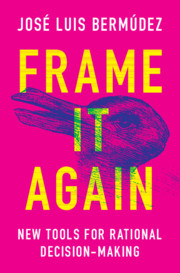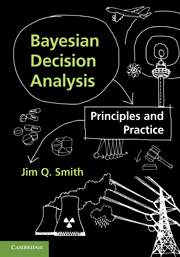Prospect Theory
Prospect Theory: For Risk and Ambiguity, provides a comprehensive and accessible textbook treatment of the way decisions are made both when we have the statistical probabilities associated with uncertain future events (risk) and when we lack them (ambiguity). The book presents models, primarily prospect theory, that are both tractable and psychologically realistic. A method of presentation is chosen that makes the empirical meaning of each theoretical model completely transparent. Prospect theory has many applications in a wide variety of disciplines. The material in the book has been carefully organized to allow readers to select pathways through the book relevant to their own interests. With numerous exercises and worked examples, the book is ideally suited to the needs of students taking courses in decision theory in economics, mathematics, finance, psychology, management science, health, computer science, Bayesian statistics, and engineering.
- The most complete and up-to-date textbook on decision theory available
- Organization of material allows readers with different interests to select appropriate pathways through book so suitable for use on decision courses in economics, business, medicine and engineering
- Contains 180 exercises with solutions provided for self study plus additional assignments with solutions provided on password-protected website
Reviews & endorsements
“Peter Wakker’s new book provides a brilliant account of what has happened in the field of decision theory during the last twenty years. Decision analysts will find here many tools and assessment techniques that will enlarge their usual bag of tricks. One of the virtues of the remarkable text is that it will help to reduce the gap between the models developed by decision theorists and the ones used in practice by most decision analysts. Every serious decision analyst should have a copy of this book at hand.” - Denis Bouyssou, CNRS and Université Paris-Dauphine
“This is a long-overdue book, from one of the leading authorities in the field. Wakker is a leader both on the theoretical underpinnings of decision theory and in applying decision theory to practice; he also has an encyclopaedic knowledge of the field. The book is structured in a way that should make it easily accessible to a broad audience, from more mathematically-oriented readers interested in the foundations to practitioners interested in applying the ideas.” - Joseph Y. Halpern, Cornell University
“This masterful survey of major theories of choice and of their implications for measurement represents two decades of research and teaching by a flawless perfectionist. Wakker’s view of the field is scholarly, coherent and deeply personal.” - Daniel Kahneman, Princeton University, Nobel Laureate in Economic Sciences, 2002
"This book organizes, develops and presents both the classical expected utility and newer non-expected utility models of decision making in a way that only Peter Wakker could do. Readers interested in understanding how individuals do, and how they should, make decisions under conditions of risk or uncertainty could do no better than to consult this volume." - Mark Machina, University of California, San Diego
“Peter Wakker’s book conveys the beauty and practical value of formal thinking about decisions with uncertainty, with minimal mathematical fuss. Scholars who have lived with this material for years will still find much that is new.” - Drazen Prelec, Massachusetts Institute of Technology
“The need for realistic models of economic decisions involving risk and uncertainty, with plausible behavioral foundations, has never been more acute. Peter Wakker provides an intuitive and accessible, but rigorous, treatment of prospect theory, widely accepted as the main alternative to the hyper-rational expected utility model. This is the only book-length treatment of this important topic, and seems certain to dominate the field for years to come.” - John Quiggin, University of Queensland
"Given this background, it is not a surprise that his book is a very thoughtful and in-depth overview of prospect theory." -- Marc Oliver Rieger, Mathematical Reviews
Product details
August 2010Paperback
9780521748681
518 pages
244 × 173 × 23 mm
1kg
106 b/w illus. 57 tables 187 exercises
Available
Table of Contents
- Preface
- Introduction
- Part I. Expected Utility:
- 1. The general model of decision under uncertainty no-arbitrage (expected utility with known utilities and unknown probabilities)
- 2. Expected utility with known probabilities - 'risk' - and unknown utilities
- 3. Applications of expected utility for risk
- 4. Expected utility with unknown probabilities and unknown utilities
- Part II. Nonexpected Utility for Risk:
- 5. Heuristic arguments for probabilistic sensitivity and rank dependence
- 6. Probabilistic sensitivity and rank dependence analyzed
- 7. Applications and extensions of rank dependence
- 8. Where prospect theory deviates from rank-dependent utility and expected utility: reference dependence versus asset integration
- 9. Prospect theory for decision under risk
- Part III. Nonexpected Utility for Uncertainty:
- 10. Extending rank-dependent utility from risk to uncertainty
- 11. Ambiguity: where uncertainty extends beyond risk
- 12. Prospect theory for uncertainty
- 13. Conclusion
- Appendices
- References
- Index.




